On June 25, 2022, US Soccer released a statement responding to the Supreme Court’s overturning of Roe v Wade. That decision, coming from Dobbs vs Jackson Women’s Health Organization, took away a women’s constitutional right to an abortion.
Here is what U.S. Soccer released a day after the U.S. Supreme Court’s ruling.
“The Supreme Court ruling on 24 June is counter to the freedoms promised as a nation and as a people. US Soccer will advocate at every opportunity for human rights, including the right to make personal healthcare decisions as there is no equality without bodily autonomy. As our National Teams continue to play in states across the country, U.S. Soccer will continue to use our platform to fight for fundamental human rights, inclusion, tolerance, freedom and equality.”
It is refreshing to see U.S. Soccer’s quick response. In previous instances of players voicing up their opinions on social issues, U.S. Soccer is not famous for its timeliness and sincerity. The federation did not support the Black Lives Matter Movement until the murder of George Floyd. Before then, U.S. Soccer issued a ban on kneeling during the National Anthem. USWNT star Megan Rapinoe knelt in solidarity with NFL quarterback Colin Kaepernick. Perhaps the leadership change from Sunil Gulati and Carlos Cordeiro to Cindy Parlow Cone factors into this corporate activism.
With this statement, U.S. Soccer made a commitment. The soccer organization must hold true to that decision. This is particularly true with the 2026 World Cup coming in less than four years.
US Soccer potential reaction to Roe v Wade overturn
Four years from now, the United States, Mexico, and Canada host the 2026 Men’s World Cup. Currently, U.S. Soccer and FIFA plan to hold games in three host cities where abortion bans are in place. Texas cities Dallas and Houston, along with Arrowhead Stadium in Kansas City, Missouri, all came out as hosts just eight days before the Supreme Court ruling. Previously, FIFA expressed concern over the U.S. policy on a ban from Muslim-majority nations during the President Trump administration. Therefore, precedent exists for FIFA to draw ire over political policies in the United States.
Is FIFA likely to alter its plans due to human rights violations for the 2026 World Cup? It is extremely unlikely. The Russia 2018 and Qatar 2022 World Cups are evidence of that.
Nonetheless, U.S Soccer could pressure and advocate for a change in host cities to reflect new political circumstances. For example, Chicago (Soldier Field), Washington, D.C (FedEx Field), and Denver (Empower Field at Mile High) are all viable options. Chicago voluntarily withdrew while Washington, D.C., and Denver did not get selected by FIFA. None of those states have anti-abortion laws in place. Both Chicago and Washington, D.C., hosted games in the 1994 and 1999 World Cups.
In the past, FIFA moved entire World Cups. The 1986 World Cup moved from Colombia to Mexico. Then, the 2003 Women’s World Cup shifted from China to the United States. Therefore, choosing different host cities is feasible.
Boycotting locations
This form of boycott is not new. In 2016, during the HB2, Public Facilities Privacy and Security Act scandal in North Carolina, sporting organizations pulled their events from North Carolina cities. The NBA, for example, pulled the 2017 All Star Game from Charlotte. These moves and other departures in the tourism section cost the state more than $196 million. U.S. Soccer and FIFA may not be willing to face the potential political backlash.
FIFA ultimately would have the final say in whether or not the 2026 Men’s World Cup host cities would be changed. Yet, it is within U.S. Soccer’s power to propose it. Additionally, U.S. Soccer could refuse to schedule future USMNT and USWNT matches in states with anti-abortion bans indefinitely.
In doing so, U.S. Soccer would demonstrate its willingness to stand up for human rights. This is under not only the magnifying glass of the United States, but under the global spotlight as well. Especially given the further commitment to women’s rights after its recent agreement to pay the USWNT and the USMNT under the same CBA.
These options, especially if U.S. Soccer chose to do both, would hurt Texas and Missouri financially, and potentially warn other states with 2026 Men’s World Cup hosting rights of the economic impact of their decisions. It could also start a domino effect of other sporting organizations.
Yet, if U.S. Soccer only releases more statements and advocacy through gameday messaging, how concrete is its commitment?
PHOTO: YUKI IWAMURA/AFP via Getty Images
200+ Channels With Sports & News
- Starting price: $33/mo. for fubo Latino Package
- Watch Premier League, Women’s World Cup, Euro 2024 & Gold Cup
The New Home of MLS
- Price: $14.99/mo. for MLS Season Pass
- Watch every MLS game including playoffs & Leagues Cup
Many Sports & ESPN Originals
- Price: $10.99/mo. (or get ESPN+, Hulu & Disney+ for $14.99/mo.)
- Features Bundesliga, LaLiga, Championship, & FA Cup
2,000+ soccer games per year
- Price: $5.99/mo
- Features Champions League, Serie A, Europa League & Brasileirāo
175 Premier League Games & PL TV
- Starting price: $5.99/mo. for Peacock Premium
- Watch 175 exclusive EPL games per season






